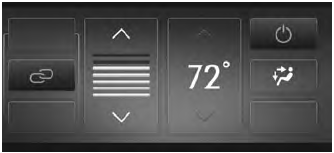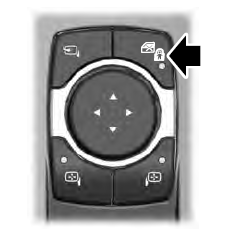Lincoln Aviator: Climate Control / Rear Passenger Climate Controls
Use the rear passenger touchscreen to select the following:
 Touch the climate button on the
feature bar to access the rear
passenger climate control screen.
Touch the climate button on the
feature bar to access the rear
passenger climate control screen.
Rear Passenger Climate Control Screen

Selecting a Row
Touch 2nd Row to control the second row climate.
Touch 3rd Row to control the third row climate.
Linking the Rows
 Touch the button to
simultaneously
control the climate of the second
and third row.
Touch the button to
simultaneously
control the climate of the second
and third row.
Setting the Rear Blower Motor Speed
 Touch the arrow buttons to
adjust
the volume of air circulated in the
rear passenger compartment.
Touch the arrow buttons to
adjust
the volume of air circulated in the
rear passenger compartment.
Setting the Rear Temperature
Touch the arrow buttons to set the temperature in the rear passenger compartment.
Switching the Rear Climate Control On and Off
 Touch the button to switch the
selected row controls on or off.
Touch the button to switch the
selected row controls on or off.
Note: When linked, touch the button to switch both rows on or off.
Directing Air to the Overhead and Rear Footwell Air Vents
 Touch the button to activate the
selection screen.
Touch the button to activate the
selection screen.
 Touch the button to direct
airflow
to the overhead air vents.
Touch the button to direct
airflow
to the overhead air vents.
 Touch the button to direct
airflow
to the rear footwell air vents.
Touch the button to direct
airflow
to the rear footwell air vents.
Switching Rear Auto Mode On and Off
Touch AUTO switch on rear automatic operation, then set the temperature.
Rear Climate Control Lock Message
A message displays when the controls are locked through the front and you try to operate them.
 Hints on Controlling the Interior Climate
Hints on Controlling the Interior Climate
General Hints
Note: Prolonged use of recirculated air may
cause the windows to fog up.
Note: You may feel a small amount of air
from the footwell air vents regardless of the
air distribution setting...
 Heated Rear Window and Heated Exterior Mirrors
Heated Rear Window and Heated Exterior Mirrors
Heated Rear Window
Press the button to clear the
rear
window of thin ice and fog. The
heated rear window turns off after
a short period of time.
Note: Do not use harsh chemicals, razor
blades or other sharp objects to clean or
remove decals from the inside of the heated
rear window...
Other information:
Lincoln Aviator 2020-2026 Owners Manual: Route Guidance
Turn indicator. Select to hear the last voice prompt. Point of interest. Estimated time of arrival, distance to destination or time to destination. Current road. Mute guidance prompts. Note: To change guidance prompt volume, turn the volume control when a guidance prompt plays...
Lincoln Aviator 2020-2026 Service Manual: Specifications
Specifications Item Specification Rear fixed glass panel to roof flushness, side (at front of glass) 0 ± 0.08 in (0 ± 2.0 mm) Rear fixed glass panel to roof flushness, rear 0 ± 0...
Categories
- Manuals Home
- Lincoln Aviator Owners Manual
- Lincoln Aviator Service Manual
- Description and Operation - Jacking and Lifting
- Keyless Entry
- Description and Operation - Body and Frame
- New on site
- Most important about car
Child Safety Locks
When the child safety locks are set, you cannot open the rear doors from the inside.

The child safety lock control is on the driver door.
Press the control to switch the child safety locks on. Press the control again to switch them off. A light on the child safety control illuminates when you switch them on.
